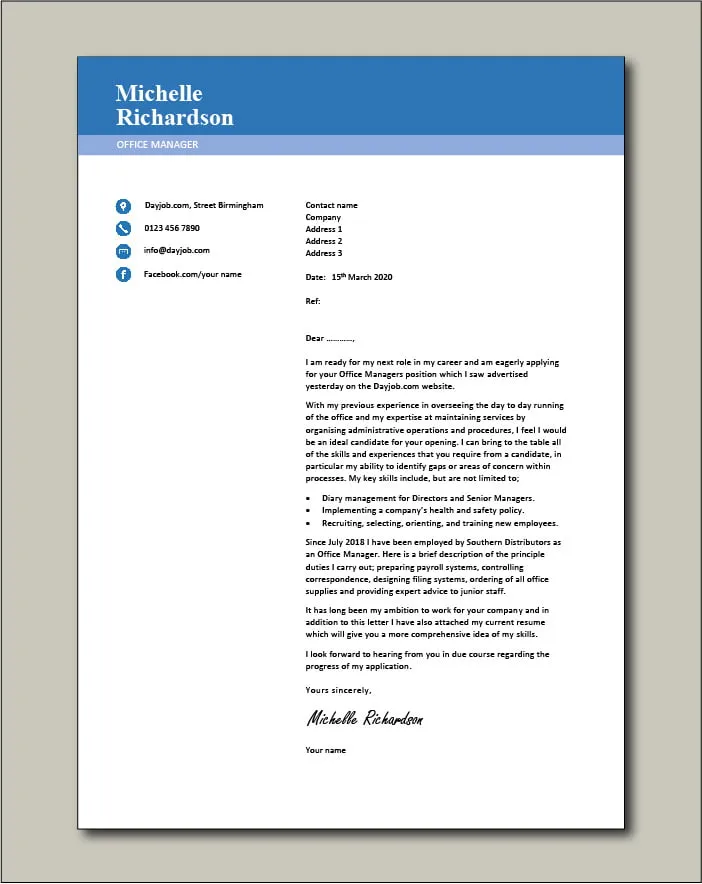Why a Strong Office Manager Cover Letter Matters
In the competitive job market, a well-crafted cover letter is your first opportunity to make a positive impression on potential employers. For an Office Manager position, a strong cover letter is not just a formality; it’s a crucial tool that can significantly boost your chances of landing an interview. It provides you with the space to highlight your skills, experience, and personality in a way that a resume alone cannot. Your cover letter serves as your personal introduction, and a well-written one demonstrates your attention to detail, communication skills, and enthusiasm for the role. It allows you to explain why you are the perfect fit for the company and the specific requirements of the Office Manager position. Failing to submit a compelling cover letter can be a missed opportunity, potentially leading to your application being overlooked. It’s the first step towards showcasing your value and setting yourself apart from other candidates, so make it count.
What to Include in Your Office Manager Cover Letter
A comprehensive cover letter for an Office Manager role should include several key elements to effectively convey your qualifications and suitability. Begin with your contact information, the date, and the hiring manager’s details. The body of your letter should then be thoughtfully structured, starting with a compelling salutation that addresses the hiring manager by name, if possible. Next, highlight your relevant skills and experience, making sure to address the key responsibilities outlined in the job description. Showcase your achievements and quantify them whenever possible to demonstrate your impact in previous roles. Tailor your letter to the specific company and position by researching the organization and matching your skills to their needs. Finish with a strong closing, expressing your enthusiasm for the opportunity and including a clear call to action. Proofread and edit your cover letter carefully, ensuring it is free of errors and well-formatted, to leave a professional impression.
Your Contact Information
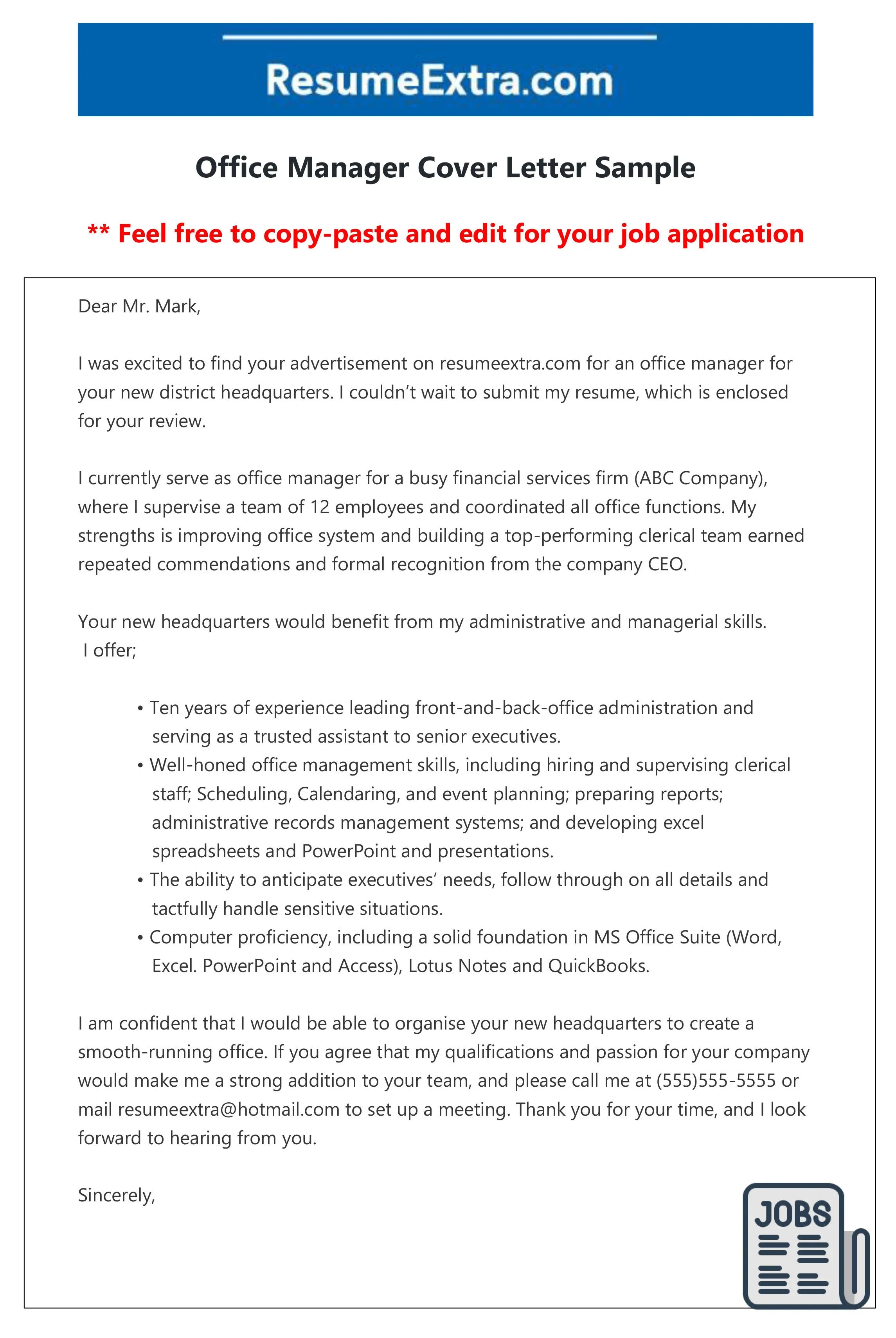
At the top of your cover letter, include your contact information. This should clearly state your full name, phone number, professional email address, and optionally, your LinkedIn profile URL. Ensure that the email address is professional and appropriate. Accuracy here is crucial because this is how the hiring manager will reach you if they are interested in your application. Using a clean and easy-to-read format will ensure that your contact information is easily accessible and visible. This initial section sets the stage for the rest of your letter, so making a positive and professional start is essential.
The Date
Following your contact information, include the date on which you are sending the cover letter. This is a standard element that provides a reference point. The date should be formatted correctly, using a standard format such as Month Day, Year. This ensures that the hiring manager knows when the letter was written and submitted. It is a small detail, but it reflects your attention to detail and professionalism. The date is usually placed below your contact information, creating a neat and organized appearance for your cover letter.
Hiring Manager’s Information
Directly below the date, address the hiring manager by name, title, and company. Finding the hiring manager’s name can be accomplished through LinkedIn, the company website, or even by calling the company’s main line and asking. Addressing the letter to a specific person shows that you have done your research and are genuinely interested in the role. If you can’t find a name, use a professional greeting like ‘Dear Hiring Manager’. Accuracy in this section shows your attention to detail and professionalism. Addressing the letter to the specific hiring manager or the person responsible for hiring demonstrates your initiative, and genuine interest in the position.
Crafting the Perfect Salutation
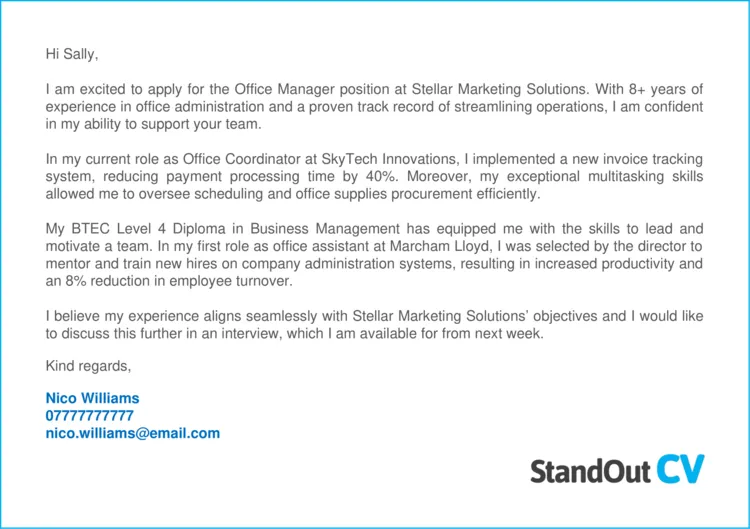
The salutation is your first chance to make a positive impression. If you know the hiring manager’s name, use it! For instance, ‘Dear Mr. Smith’. If you’re unsure of the name, using a general greeting like ‘Dear Hiring Manager’ is acceptable, but try to find out the name if possible. The salutation sets the tone for your entire letter, so keep it formal and respectful. Avoid overly casual greetings. This will establish a tone of professionalism from the outset of your application. It reflects your understanding of workplace etiquette and your respect for the recipient, setting a professional tone right from the start.
Highlighting Your Skills and Experience
In the body of your cover letter, it is essential to highlight your skills and experience relevant to the Office Manager position. Reference the job description and identify the key skills and qualifications the employer is seeking. Provide specific examples from your past roles to demonstrate how you have utilized these skills and achieved positive outcomes. Use action verbs to describe your responsibilities and accomplishments. Tailor your content to the specific requirements of the job. This ensures the hiring manager understands how your background aligns with the company’s needs. When providing examples, quantify your achievements with numbers to showcase the impact of your work. By focusing on relevant experience, you provide a clear and concise overview of your qualifications.
Administrative and Organizational Skills
As an Office Manager, you must highlight your administrative and organizational skills. These skills are fundamental to the role and demonstrate your ability to manage and coordinate office operations. Mention your proficiency in managing schedules, coordinating meetings, and handling correspondence. Detail your experience with filing systems, record-keeping, and maintaining office supplies. Provide specific examples of your achievements. For instance, describe how you improved office efficiency by implementing a new organizational system or streamlined a process to save time or reduce costs. Explain how you maintain an organized, efficient, and welcoming office environment.
Communication and Interpersonal Abilities
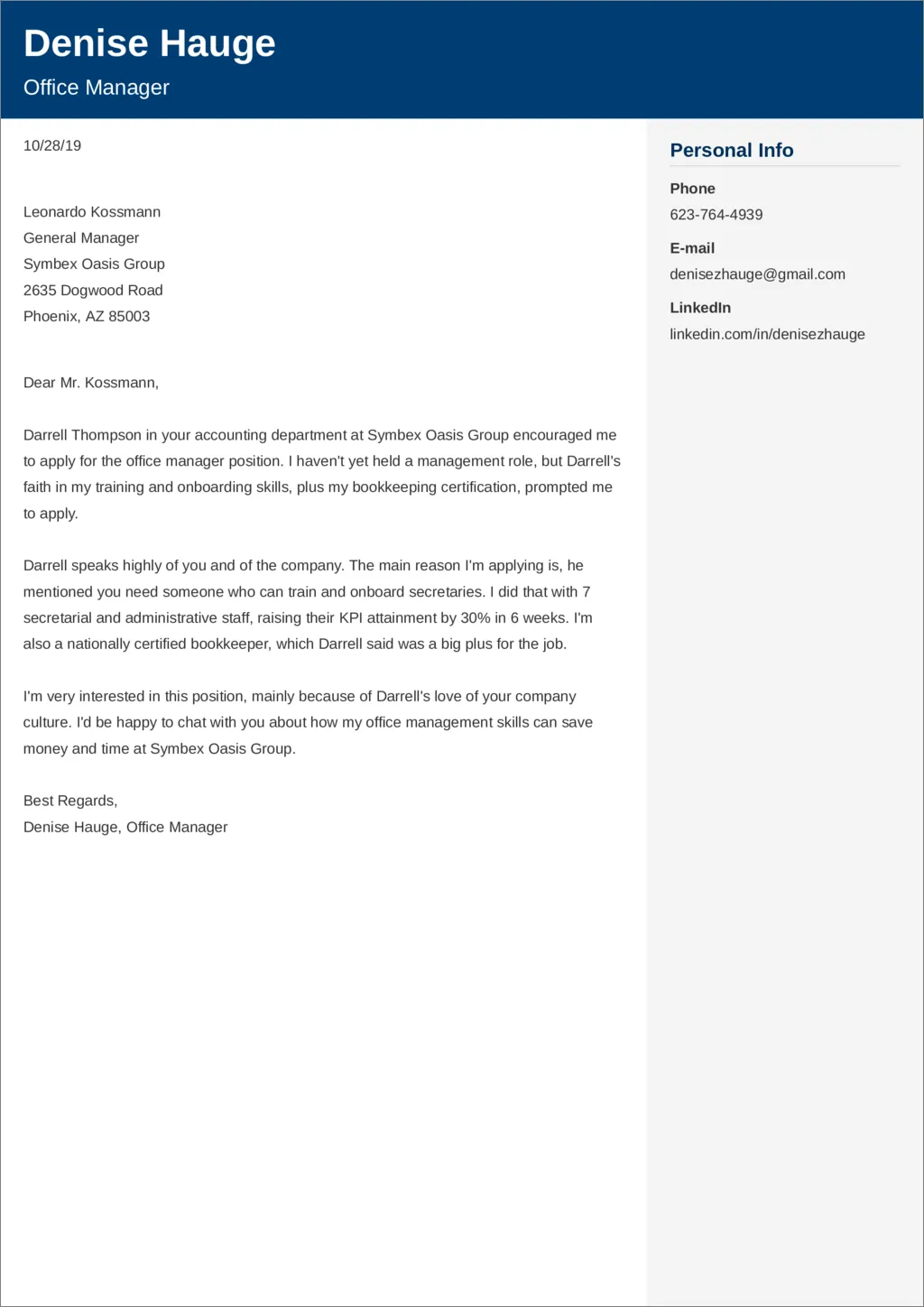
Communication and interpersonal abilities are critical for an Office Manager. Showcase your ability to communicate clearly and effectively with colleagues, clients, and vendors. Emphasize your experience in handling phone calls, emails, and written correspondence professionally. Highlight your ability to build positive relationships and resolve conflicts. Give examples of how you’ve successfully managed challenging situations, such as addressing complaints or mediating disputes. Illustrate how you maintain a welcoming and supportive office environment and foster positive team dynamics. Showcase your interpersonal skills through examples that underscore your proficiency in building rapport.
Problem-Solving and Decision-Making Skills
Demonstrate your problem-solving and decision-making skills by sharing specific examples of how you have addressed challenges. Detail how you analyze problems, develop solutions, and make informed decisions to improve office operations. Mention your experience in identifying and resolving issues, such as managing budgets, dealing with vendors, or implementing new policies. Quantify your successes with specific numbers or metrics, if possible. For example, describe how your decision-making skills led to cost savings or process improvements. Highlight your abilities to make critical choices under pressure and take initiative when needed. Ensure you provide concrete examples that prove your expertise.
Showcasing Your Achievements
Highlighting your achievements is a very important aspect of your cover letter. Instead of just listing responsibilities, provide compelling examples of your accomplishments in previous roles. This is where you can differentiate yourself from other candidates. Use the STAR method – Situation, Task, Action, Result – to structure your examples and show how you made a real impact. Detail what the situation was, what the task was, the actions you took, and the results you achieved. This method clearly illustrates your skills and abilities. By emphasizing accomplishments, you provide concrete evidence of your value, showing your potential to excel as an Office Manager. Give specific examples that prove your expertise.
Quantify Your Accomplishments
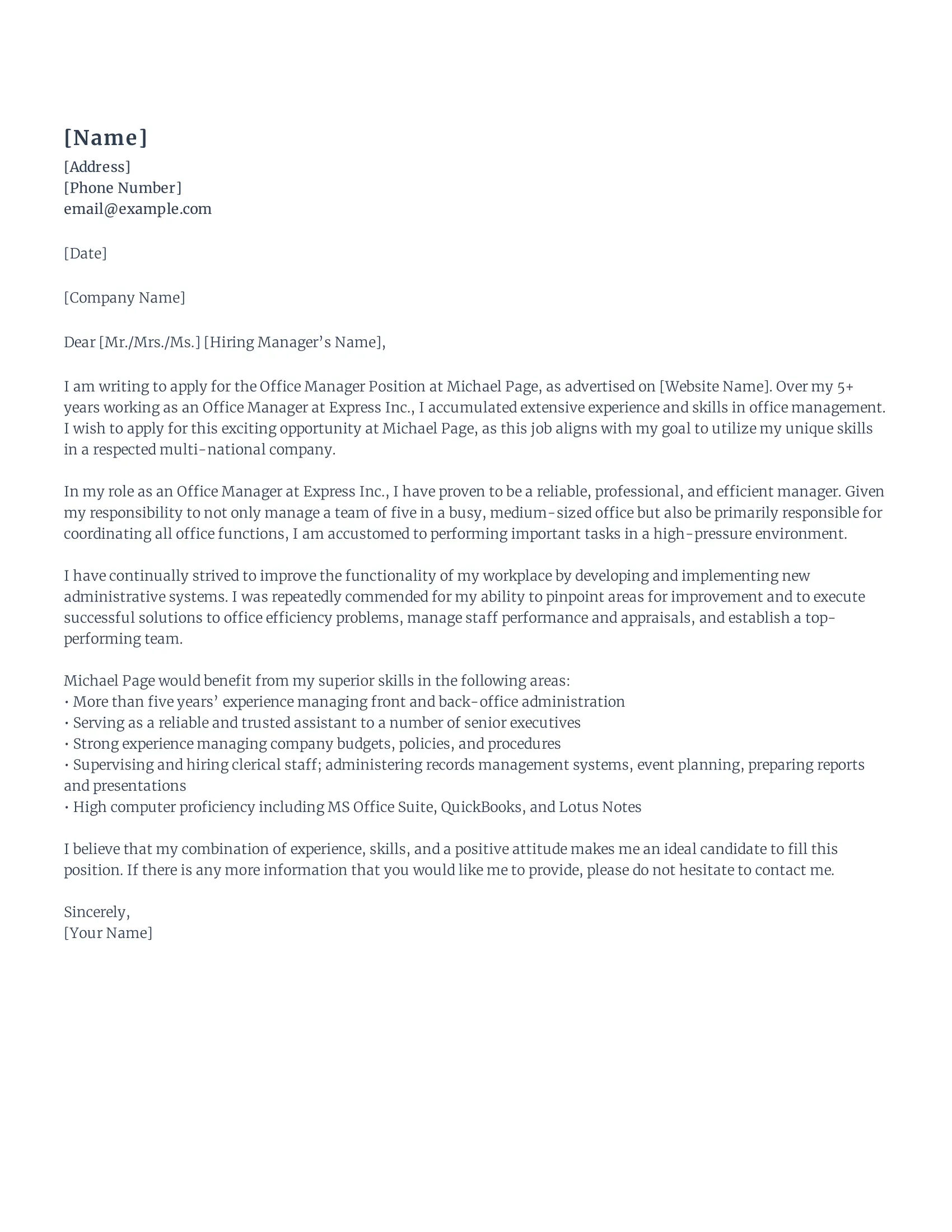
Whenever possible, quantify your accomplishments to add credibility to your cover letter. Use numbers, percentages, and metrics to demonstrate the impact of your work. For example, instead of saying ‘Improved office efficiency,’ state ‘Improved office efficiency by 15% through the implementation of a new filing system.’ Similarly, quantify your successes in terms of time saved, costs reduced, or processes streamlined. Provide metrics to quantify the results of your actions to make a compelling case for your abilities. By using measurable data, you offer concrete evidence of your impact. This turns vague claims into impactful evidence, making your application far more persuasive.
Tailoring Your Cover Letter to the Job Description
The most successful cover letters are tailored to the specific job description. Start by carefully reading the job posting and identifying the key requirements, skills, and qualifications. Then, customize your cover letter to address these needs directly. Highlight the experiences, skills, and achievements that align with the employer’s expectations. Use the same keywords and phrases from the job description to demonstrate that you have the right qualifications. Tailoring your cover letter shows that you have researched the company and are genuinely interested in the role, and that you also meet the specific needs of the employer. This helps you create a connection and demonstrate your understanding of the role’s requirements.
Researching the Company
Before writing your cover letter, do some research on the company. Visit their website, read their mission statement, and review their values. Understand the company’s culture, their products or services, and their recent achievements. This research will allow you to customize your cover letter to fit the company’s needs and show that you genuinely understand the role. Mentioning specific company projects or initiatives in your cover letter indicates your interest in the role and demonstrates that you have taken the time to get to know the organization. This knowledge will help you tailor your letter to reflect the company’s values and goals.
Matching Skills to Requirements
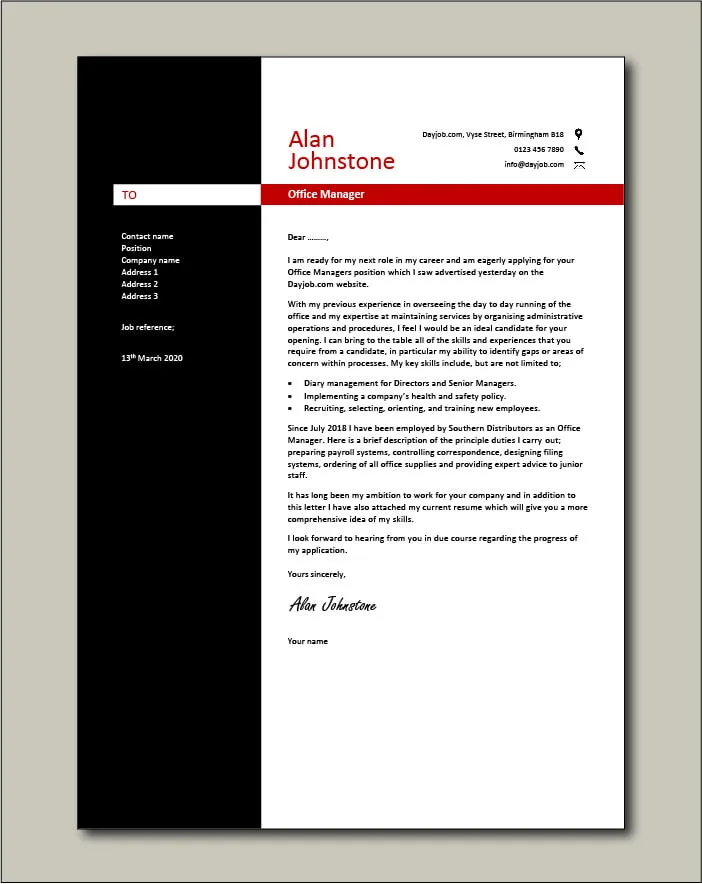
Carefully review the job description and identify the key skills and qualifications the employer is seeking. Then, align your experience, skills, and achievements with those requirements. Provide examples that demonstrate how you have used these skills in previous roles. Use the same keywords and phrases from the job description in your cover letter. This will help the hiring manager quickly see that you possess the necessary skills and qualifications for the position. By matching your skills to the job requirements, you effectively demonstrate that you are a strong candidate and can meet the needs of the organization.
Writing a Compelling Closing
The closing of your cover letter is your opportunity to summarize your interest in the position and reinforce your value. Express your enthusiasm for the opportunity and reiterate why you are the best fit for the role. Use a confident and professional tone to show that you are the ideal candidate. Make sure your closing is well-written and persuasive. Highlight your desire to contribute to the company’s success. A good closing leaves a lasting positive impression and encourages the hiring manager to want to contact you for an interview.
Expressing Enthusiasm
Expressing enthusiasm is key to ending your cover letter on a positive note. Show your excitement about the opportunity and express your genuine interest in the role. Mention specific aspects of the job or the company that appeal to you. This will demonstrate to the hiring manager that you are genuinely interested in the position and not just looking for any job. Express your enthusiasm for the position to create a more positive impression. Highlighting your genuine interest can significantly boost your chances of landing an interview.
Call to Action
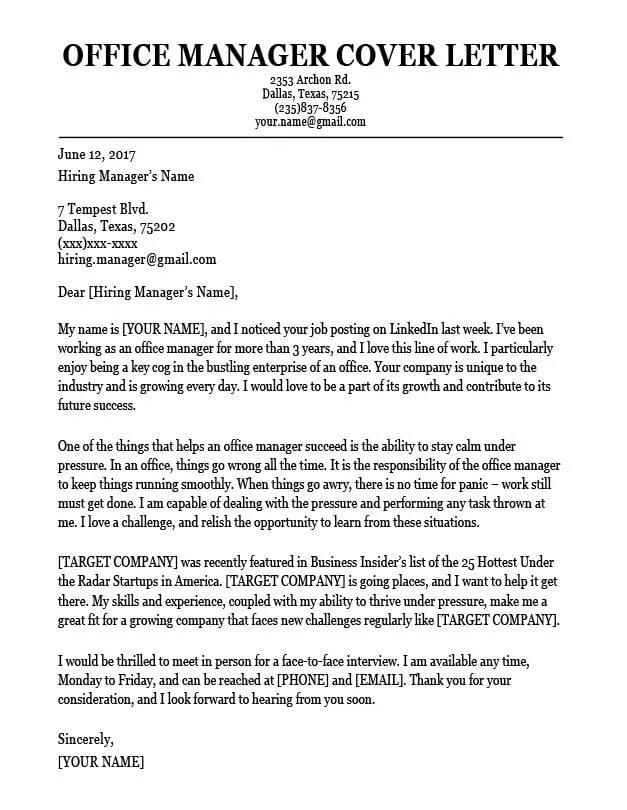
Include a clear call to action in your closing to encourage the hiring manager to take the next step. State your willingness to discuss your qualifications further in an interview. Provide your contact information again, making it easy for the hiring manager to reach out to you. End your letter by thanking the hiring manager for their time and consideration. A clear call to action shows your initiative and makes it easy for the employer to move forward. Your call to action can range from offering to provide additional references to expressing your availability for an interview.
Proofreading and Editing
Before submitting your cover letter, proofread and edit it carefully to ensure there are no errors in grammar, spelling, or punctuation. A cover letter filled with errors can undermine your professionalism and make a negative impression on the hiring manager. Read through your cover letter multiple times, and consider asking a friend or family member to review it as well. Use grammar and spell-checking tools, but don’t rely on them entirely, as they may miss subtle mistakes. Proofreading is a crucial final step in the application process. Correcting even small errors shows attention to detail and professionalism, which are essential qualities for an Office Manager. A polished cover letter shows your commitment to excellence and increases your chances of being hired.
Formatting Your Cover Letter
Proper formatting enhances readability and helps make your cover letter look professional. Use a standard font, such as Times New Roman or Arial, and maintain a consistent font size (11 or 12 points). Use single spacing within paragraphs and double spacing between paragraphs. Keep your cover letter concise – aim for one page, if possible. Organize the content clearly with headings, bullet points, and ample white space. Make sure all content is aligned correctly and the overall design is clean and easy to read. Correct formatting is crucial for making a strong first impression. A well-formatted cover letter demonstrates your attention to detail, and this attention to detail is a valued quality for Office Managers. Formatting enhances clarity, making your message more effective and increasing your chances of landing an interview.
